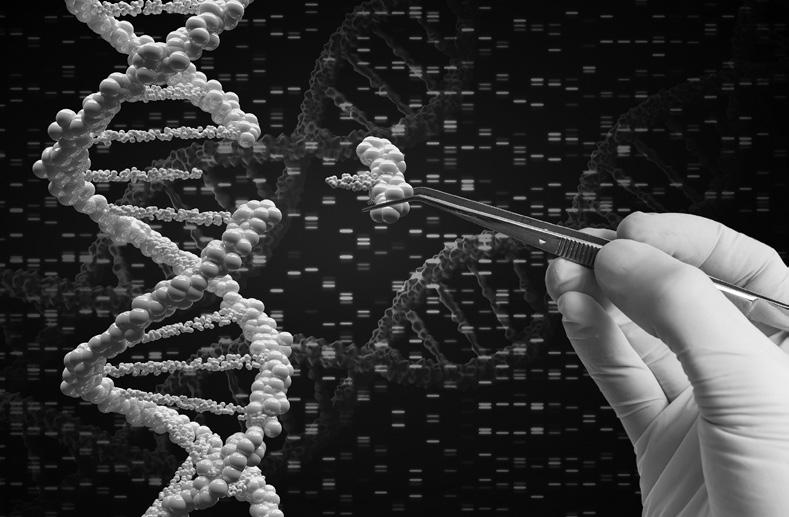A BIBLICAL VIEW ON Genetic Engineering
Kerby Anderson



Kerby Anderson



We live in the age of genetics. Some futurists predict genetic engineering and biotechnology will have a greater impact on our world than the industrial revolution. Knowledge in genetics is doubling every few years. Genetic engineering is no longer science fiction; it is scientific fact. How powerful a technology is genetic engineering? For the first time in human history, it is possible to completely redesign existing organisms, including humans, and to direct the genetic and reproductive constitution of every living thing. Scientists are no longer limited to breeding and cross-pollination. Powerful genetic tools allow us to change
genetic structure at the microscopic level and bypass the normal processes of reproduction.
For the first time in human history, it is also possible to make multiple copies of any existing organism or of certain sections of its genetic structure. This ability to clone existing organisms or their genes gives scientists a powerful tool to reproduce helpful and useful genetic material within a population.
Scientists are also developing techniques to treat and cure genetic diseases through genetic surgery and genetic therapy. They can already identify genetic sequences that are defective, and scientists will be able to replace these defects with properly functioning genes.
Recombinant DNA research (rDNA) began in the 1970s with new genetic techniques that allowed scientists to cut small pieces of DNA (known as plasmids) into small segments that could be inserted in host DNA. The new creatures that were designed have
been called DNA chimeras because they are conceptually like the mythological Chimera (a creature with the head of a lion, the body of a goat, and the tail of a serpent).
Recombinant DNA technology was fundamentally different from other forms of genetic breeding used in the past. Breeding programs work on existing arrays of genetic variability in a species, isolating specific genetic traits through selective breeding. Scientists using rDNA technology can essentially “stack” the deck or even produce an entirely new deck of genetic “cards.”
A new advance in gene splicing has come from CRISPR, which stands for Clustered Regularly Interspaced Short Palindromic Repeats. This genetic technique can be used to target specific sections of the genetic code. Scientists can use it to edit DNA at precise locations. They can also use it as a diagnostic tool.
These forms of gene splicing allow scientists to permanently modify genes in living cells and organisms. It can also be used to correct mutations at precise locations in the human genome and thus treat and even
cure the genetic causes of disease.
But this powerful ability to change the genetic deck of cards also raises substantial scientific concerns that some “sleight-ofhand” would produce dangerous consequences. Ethan Singer said, “Those who are powerful in society will do the shuffling; their genes will be shuffled in one direction, while the genes of the rest of us will get shuffled in another.” 1 Another concern is that a reshuffled deck of genes might create an Andromeda strain similar to the one Michael Crichton envisioned in his book by the same title. 2 A microorganism might inadvertently be given the genetic structure for some pathogen for which there is no antidote or vaccine.
A foundational biblical question is whether genetic engineering should be used and, if permitted, how it should be used. The natural reaction for many in society is to reject new forms of technology because they are dangerous. Christians should remember God’s command in the cultural mandate (Genesis 1:28) and consider how genetic technology should be used responsibly.
One key issue is the worldview behind most scientific research. Modern science rests on an evolutionary assumption. Many scientists assume that life on this planet is the result of millions of years of a chance evolutionary process. Therefore, they conclude that intelligent scientists can do a better job of directing the evolutionary process than nature can do by chance.
Genetic engineering gives scientists the tools they have always wanted to drive the evolutionary spiral higher and higher. Julian Huxley looked forward to the day in which scientists could fill the “position of business manager for the cosmic process of evolution.” 3 Scientists can create new forms of life and alter existing forms in ways that have been impossible until now.
How should Christians respond? They should humbly acknowledge that God is the sovereign Creator and that humans have finite knowledge. Genetic engineering gives scientists the technological ability to be gods, but they lack the wisdom, knowledge, and moral capacity to act like God.
What is the place for genetic engineering
within a biblical framework? The answer to that question can be found by distinguishing between two types of research. The first could be called genetic repair. This research attempts to remove genetic defects and develop techniques that will provide treatments for existing diseases. Applications would include various forms of genetic therapy and genetic surgery as well as modifications of existing microorganisms to produce beneficial results.
Genetic disease is the result of the Fall (Genesis 3), not part of God’s plan for the world. Christians can apply technology to fight these evils without being accused of fighting against God’s will. Genetic engineering can and should be used to treat and cure genetic diseases.
A second type of research is the creation of new forms of life. While minor modifications of existing organisms may be permissible, Christians should be concerned about the large-scale production of novel life forms. One can only imagine the devastation that could occur when a newly created organism is introduced into a new environment.
God created plants and animals as “kinds” (Genesis 1:24). While there is minor variability within these created kinds, built-in barriers exist between these created kinds. Redesigning creatures of any kind cannot be predicted the same way new elements on the periodic chart can be predicted for properties even before they are discovered. Genetic engineering offers great promise in treating genetic disease, but Christians should also be vigilant. While this technology should be used to repair genetic defects, it should not be used to confer the role of creator on scientists.
Another type of genetic engineering is cloning. Scientists have already been able to clone animals, but should we clone human beings? That question raises significant questions beginning with the issue of the sanctity of life. Human beings are created in the image of God (Genesis 1:26–27) and therefore differ from animals. Human cloning, like other forms of genetic engineering, could be used to usher in a “brave new world” of Alphas, Betas, Gammas, and
Deltas from Aldous Huxley’s book Brave
New World. 4
Each person contributes to both the unity and diversity of humanity. Such a contribution is perhaps best expressed by the Jewish Midrash: “For a man stamps many coins in one mold and they are all alike; but the King who is King over all kings, the Holy One blessed be He, stamped every man in the mold of the first man, yet not one of them resembles his fellow.” Christians should reject future research plans to clone a human being and should reject using cloning as an alternative means of reproduction.
Science is moving too fast. For example, when researchers at the Francis Crick Institute in London announced that they were able to use CRISPR to edit 18 human embryos, genetic experts from several countries issued a warning and recommended that researchers “tap the brakes on gene editing.”
Scientists at the Weizmann Institute were able to create the world’s first synthetic
mouse embryo using neither sperm nor egg. These were created with embryonic stem cells and developed beating hearts, blood circulation, and brain tissue. As we have mentioned in a previous booklet on abortion, the use of human embryonic stem cells raises the same ethical concerns as abortion.
A developing world view influencing this area of genetics is transhumanism. It is an intellectual and cultural movement that seeks to transform the human condition. The leaders of this movement want to use developing technologies to eliminate aging and enhance human potential. Two primary ways they want to do this is through genetic engineering and artificial intelligence. They want to genetically create “the new man,” and they want to use technology to turn us into “cyborgs” (which is short for cybernetic organism).
The leaders of transhumanism see genetic engineering as a tool to be used to speed up the process of evolution. We can use genetics to enhance and improve the human race. If we believe that humans are merely
the product of the undirected force of evolution, then certainly intelligent scientists can “improve on nature.”
One author proclaimed the arrival of the neobiological revolution. She expressed confidence in using gene editing and brain computer interfaces “to engineer biological systems that will redefine our species and its relation to all other species on the planet.” Then she goes from confidence to hubris: “Our ability to manipulate RNA and DNA, bacteria, viruses, algae, and fungi gives us the power to engineer life.” 5
Gene Edward Veith argues “Eliminating a genetic disease by clipping the problematic gene from a strand of DNA is surely a legitimate extension of medical surgery.” But he adds that when “genetic engineering is applied to human beings it is profoundly dehumanizing.” 6 Leon Kass warned years ago that, “Engineering the engineer seems to differ in kind from engineering the engine.” 7
We are created in the image of God (Genesis 1:27), and therefore we can and should use genetic technology to treat and cure the physical effects of the Fall (Genesis 3). That
does not mean we should usurp the role of the Creator and breed a super-human race. The leaders of transhumanism believe we should use technology to improve humans so that we can become perfect and immortal. In many ways, this technological imperative harkens back to the Tower of Babel (Genesis 11). Instead, we should use technology wisely as we exercise dominion over the world (Genesis 1:28).
Kerby Anderson, Christian Ethics in Plain Language, Nashville, TN: 2005, chapter eight.
Timothy Demey and Gary Stewart, Genetic Engineering: A Christian Response: Crucial Considerations for Shaping Life, Grand Rapids, MI: Kregel, 1999.
John Stonestreet, “Playing God with Our Genes,” Breakpoint, December 19, 2019, https://www.breakpoint.org/playing-godwith-our-genes/.
Gene Edward Veith, “The Core Problem with Genetic Engineering,” January 29, 2020, https://www.crossway.org/ articles/the-core-problem-with-geneticengineering/.
1Quoted in Nicholas Wade, “Gene Splicing: Congress Starts Framing Law for Research,” Science, April 1, 1977, 39.
2Michael Crichton, The Andromeda Strain (New York: Dell, 1969).
3Quoted in Joseph Fletcher, The Ethics of Genetic Control (Garden City, NY: Anchor, 1974), 8.
4Aldous Huxley, Brave New World, (11th ed. London, England) Vintage.
5Jane Metcalfe, “Covid-19 Is Accelerating Human Transformation,” Wired, June 5, 2020, https://www.wired.com/story/covid19-is-accelerating-human-transformationdont-waste-it/.
6Gene Edward Veith, “The Core Problem with Genetic Engineering,” January 29, 2020, https://www.crossway.org/ articles/the-core-problem-with-geneticengineering/.
7Kass, Leon. “The New Biology: What Price Relieving Man’s Estate?” Science, 19 November 1971, 779.
